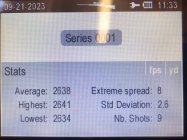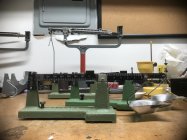You are using an out of date browser. It may not display this or other websites correctly.
You should upgrade or use an alternative browser.
You should upgrade or use an alternative browser.
Scott Parker Tuned Scales
- Thread starter Swparks
- Start date
Liven The Dream
Gold $$ Contributor
I have had one for awhile. VG.
I keep it now for back up.
I keep it now for back up.
It's all good when it gets you where you want to go. . .I bit the bullet, pun intended, and bought a Scott Parker tuned beam scale. I can say this with all honesty, It was well worth it! The scale is dead on and repeats every time. It will zero in less than 4 seconds. I couldn't be happier with it! Thank you Scott Parker!

MikeT
Silver $$ Contributor
Same experience here. In gravity I trust - and in Scott's work.I bit the bullet, pun intended, and bought a Scott Parker tuned beam scale. I can say this with all honesty, It was well worth it! The scale is dead on and repeats every time. It will zero in less than 4 seconds. I couldn't be happier with it! Thank you Scott Parker!
+1
sparker
Silver $$ Contributor
Thank you sir.I bit the bullet, pun intended, and bought a Scott Parker tuned beam scale. I can say this with all honesty, It was well worth it! The scale is dead on and repeats every time. It will zero in less than 4 seconds. I couldn't be happier with it! Thank you Scott Parker!
Yes! I was loading today to do some load testing and it would read a kernel of N540 and Varget.I love my Scott Parker tuned OHaus. Reads to the kernel. This was 43.3 N150 / B200-20x…
CaptJim
Silver $$ Contributor
I love older tools that really work. I had the pleasure of using some really old woodworking machines that were phenomenal.
I had a Redding No.1 scale years ago that got away from me somehow and when I noticed Scott had one for sale that he had tuned, I bought it.
Money well spent! That old scale is EXTREMELY accurate and consistent. For precise loading I stopped using the Chargemaster I had and switched to throwing a light charge and trickling up with a Redding cast iron trickier. After a period of time I sold the Chargemaster.
Thank You Scott!!
CJ
I had a Redding No.1 scale years ago that got away from me somehow and when I noticed Scott had one for sale that he had tuned, I bought it.
Money well spent! That old scale is EXTREMELY accurate and consistent. For precise loading I stopped using the Chargemaster I had and switched to throwing a light charge and trickling up with a Redding cast iron trickier. After a period of time I sold the Chargemaster.
Thank You Scott!!
CJ
lgwatson
Silver $$ Contributor
He tuned my Redding scale and it is spot on.I bit the bullet, pun intended, and bought a Scott Parker tuned beam scale. I can say this with all honesty, It was well worth it! The scale is dead on and repeats every time. It will zero in less than 4 seconds. I couldn't be happier with it! Thank you Scott Parker!
sparker
Silver $$ Contributor
bamaboy1960
Silver $$ Contributor
I would like to have one!
Wayne Forsyth
Wayne Forsyth
You won't regret it.I would like to have one!
Wayne Forsyth
sparker
Silver $$ Contributor
It’s coming Wayne!I would like to have one!
Wayne Forsyth
sparker
Silver $$ Contributor
@sparker ,
I would like to see a Primer Sorting video with one of your scales .
.
I've found at least 1/10 grain range in weight in CCI450 primers.
Sorting into bins might take some time but running through a flat just looking for outliers would easily take less than 10 minutes per flat. Just reading the final scale position could find light/heavy primers.
You could zero on one, or zero on the calculated average from taring a whole flat, or actually weight them (against a small check weight).
If the intent is to only eliminate extreme high/low weight the one kernel sensitivity of the beam scale should be more than adequate.
OK, one negative,
comments like "the scale is dead on" or "and it is spot on" without qualification don't carry much weight in precision weighing. I'll agree that you are a Master at this, but if you don't know the error band of an instrument because you can't see it could mean you are blind.
I would like to see a Primer Sorting video with one of your scales
I've found at least 1/10 grain range in weight in CCI450 primers.
Sorting into bins might take some time but running through a flat just looking for outliers would easily take less than 10 minutes per flat. Just reading the final scale position could find light/heavy primers.
You could zero on one, or zero on the calculated average from taring a whole flat, or actually weight them (against a small check weight).
If the intent is to only eliminate extreme high/low weight the one kernel sensitivity of the beam scale should be more than adequate.
OK, one negative,
comments like "the scale is dead on" or "and it is spot on" without qualification don't carry much weight in precision weighing. I'll agree that you are a Master at this, but if you don't know the error band of an instrument because you can't see it could mean you are blind.
Last edited:
If you're that worried about precision weighing why would you bother with beam scales? Just use an expensive digital scale. That's what all the cool kids are doing.@sparker ,
I would like to see a Primer Sorting video with one of your scales.
I've found at least 1/10 grain range in weight in CCI450 primers.
Sorting into bins might take some time but running through a flat just looking for outliers would easily take less than 10 minutes per flat. Just reading the final scale position could find light/heavy primers.
You could zero on one, or zero on the calculated average from taring a whole flat, or actually weight them (against a small check weight).
If the intent is to only eliminate extreme high/low weight the one kernel sensitivity of the beam scale should be more than adequate.
OK, one negative,
comments like "the scale is dead on" or "and it is spot on" without qualification don't carry much weight in precision weighing. I'll agree that you are a Master at this, but if you don't know the error band of an instrument because you can't see it could mean you are blind.
sparker
Silver $$ Contributor
I’m not sure that I have ever described my scales in anyway that isn’t quantified.@sparker ,
I would like to see a Primer Sorting video with one of your scales.
I've found at least 1/10 grain range in weight in CCI450 primers.
Sorting into bins might take some time but running through a flat just looking for outliers would easily take less than 10 minutes per flat. Just reading the final scale position could find light/heavy primers.
You could zero on one, or zero on the calculated average from taring a whole flat, or actually weight them (against a small check weight).
If the intent is to only eliminate extreme high/low weight the one kernel sensitivity of the beam scale should be more than adequate.
OK, one negative,
comments like "the scale is dead on" or "and it is spot on" without qualification don't carry much weight in precision weighing. I'll agree that you are a Master at this, but if you don't know the error band of an instrument because you can't see it could mean you are blind.
The quickest way to use the Redding for primer sorting is to weigh two at a time. If the pair weighs off norm, then you can weigh one of the offending pair.
Last edited:
Similar threads
- Replies
- 119
- Views
- 7,484
Upgrades & Donations
This Forum's expenses are primarily paid by member contributions. You can upgrade your Forum membership in seconds. Gold and Silver members get unlimited FREE classifieds for one year. Gold members can upload custom avatars.

Click Upgrade Membership Button ABOVE to get Gold or Silver Status.
You can also donate any amount, large or small, with the button below. Include your Forum Name in the PayPal Notes field.
To DONATE by CHECK, or make a recurring donation, CLICK HERE to learn how.

Click Upgrade Membership Button ABOVE to get Gold or Silver Status.
You can also donate any amount, large or small, with the button below. Include your Forum Name in the PayPal Notes field.
To DONATE by CHECK, or make a recurring donation, CLICK HERE to learn how.











